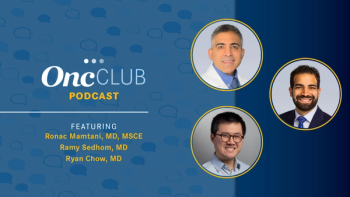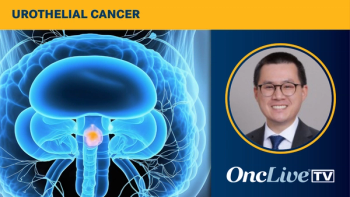
Kishan Discusses GI Toxicity Reduction With MRI-Guided SBRT in Prostate Cancer

Dr Kishan discusses the use of MRI-guided SBRT in prostate cancer to reduce acute genitourinary and gastrointestinal toxicity; findings from the MIRAGE study; and how MRI-guided SBRT allows for tighter planning margins, thereby reducing both physician-reported and patient-reported bowel and bladder toxicities.
Welcome to OncLive On Air®! I’m your host today, Jason Harris.
OncLive On Air® is a podcast from OncLive®, which provides oncology professionals with the resources and information they need to provide the best patient care. In both digital and print formats, OncLive® covers every angle of oncology practice, from new technology to treatment advances to important regulatory decisions.
In today’s episode, we had the pleasure of speaking with Amar U. Kishan, MD, the vice-chair of Clinical and Translational Research and chief of the Genitourinary Oncology Service for the Department of Radiation Oncology at the David Geffen School of Medicine at UCLA and the UCLA Jonsson Comprehensive Cancer Center. Dr Kishan joined us to discuss the use of magnetic resonance imaging (MRI)–guided stereotactic body radiotherapy (SBRT) in prostate cancer.
He was lead author for the phase 3 MIRAGE study (NCT04384770), which showed that the use of MRI-guided SBRT resulted in a significant reduction in acute genitourinary and gastrointestinal toxicity compared with standard computed tomography–guided SBRT. Overall, results indicate that MRI-guided SBRT allowed for tighter planning margins, thereby facilitating a reduction in both physician-reported and patient-reported bowel and bladder toxicities.
___
That’s all we have for today! Thanks again to my guest, Dr Amar Kishan, and you for listening to this episode of OncLive On Air®. Check back on Mondays and Thursdays for exclusive interviews with leading experts in the oncology field.
For more updates in oncology, be sure to visit www.OncLive.com and sign up for our e-newsletters.
OncLive® is also on social media. On Twitter, follow us at @OncLive and @OncLiveSOSS. On Facebook, like us at OncLive and OncLive State of the Science Summit and follow our OncLive page on LinkedIn.
If you liked today’s episode of OncLive On Air®, please consider subscribing to our podcast on Apple Podcasts, Spotify, Google Podcasts, Amazon Music, and many of your other favorite podcast platforms,* so you get a notification every time a new episode is posted. While you are there, please take a moment to rate us!
Thanks again for listening to OncLive On Air®.
*OncLive On Air® is available on: Apple Podcasts, Google Podcasts, Spotify, Amazon Music, Audacy, CastBox, Deezer, iHeart, JioSaavn, Listen Notes, Player FM, Podcast Addict, Podchaser, RadioPublic, and TuneIn.






































